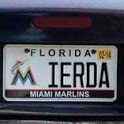In the mess that the new owners are making of the Miami Marlins, some revealing information is emerging.
Let's start with a conspiracy theory: Derek Jeter, Mr. Yankee, is destroying the team because he wants to move the Marlins somewhere else,
helping top shareholder Bruce Sherman make a quick, huge profit by flipping the team.
Thanks to County Commissioner Xavier Suarez's staff, I've seen the various contracts the team signed with the city and county in order to get their shiny new ball park (which was supposed to fix all their revenue problems). Not well versed in legalize, I found key provisions confusing, so Suarez's staff boiled it down to this:
Marlins have vowed to stay 35 years -- meaning to 2047, measured from the opening of the park in 2012. No provision to wiggle out of that.
BUT: An interesting provision is intended to keep former owner Jeffrey Loria from making too quick a profit from taxpayers' largess, embedded in a poorly named Relocation Agreement.
That made owner Jeffrey Loria promise that if he sold the team within 10 years, he had to give the county a slice.
Under terms of that agreement, Loria must pay 5 percent of the net proceeds to the county. The county attorney doesn't yet a dollar figure, says Suarez' office, but should within a few weeks. An auditing firm is examining the deal.
Interesting: If the county reveals details (and shouldn't it under public records laws?) this audit could serve as a window into the details of the deal Loria and Sherman struck.
The highly publicized number is that Loria sold for $1.2 billion -- more than seven times higher than the $158 million he was supposed to have paid in 2002.
Now, some county insiders have told the Herald that they're guessing that Loria will present figures that show this-and-that expenses to be deducted, meaning that the county will get little or nothing.
BUT: In December, MLB Commissioner Rob Manfred revealed on Dan Le Batard's radio show two fascinating details: The Marlins sale was "the single largest commitment of equity ever in the history of the game." AND The debt level didn't change from Loria's ownership to Sherman's.
Why is this important? The Herald's Barry Jackson has been reporting on how the new owners are continually seeking new investors to reduce their $400 million debt they needed to buy the team.
Dayn Perry at CBSSports.com notes about Manfred's equity remark: "OK, that's probably true. However, the Marlins are the first team sold since the Dodgers and Padres back in 2012. MLB franchises appreciate at an incredible rate, especially in recent history, and that's a lot of inflation built in. Basically, he's saying the Marlins new owners paid more cash for their $1.3-ish billion purchase than the Dodgers owners did for their $2 billion purchase (the only higher-priced sale in MLB history) six years ago. That's notable, sure, but it's not exactly amazing. Citing it also doesn't prove the Sherman group has sound finances at the moment."
The central issue -- as Le Batard kept hammering Manfred -- is why did MLB accept a new owner who was so money poor that he needed to immediately slash payroll?
Manfred insisted he had no information on the new owners' intentions in advance -- Le Batard called that an outright lie. Jackson cited inside sources that it was a complete falsehood.
"Rob," Le Batard said at one point, "I think you cared more about the $1.2 billion asking price than you did the fans of South Florida."
As Barry Jackson has pointed out, local groups -- Mas and Bush -- wanted to buy the team for less than $1.2 billion, but didn't intend to gut the team the way Sherman-Jeter has.
My take-away: Loria was a bad owner. He backloaded over-priced contracts trying to get another championship. (Former Marlins President David Samson complained recently on another Le Batard show that agent Scott Boras sweet-talked/conned the Marlins into an outrageous deal for nearly worthless pitcher Wei-Yin Chen, who will get more than $50 million over the next three years.)
But Jeter-Sherman may be even worse. It looks like their basic plan is to do nothing more than hold on to the team for a few years and then selling at a huge profit.
Most interesting revelation (to me at least) in the continuing Barry Jackson exposes: "According to a source, even though the National League announced the Marlins’ attendance at 1.6 million last season, only 820,000 were paid tickets."
Finally! Since Marlins Park opened, I've been going from 10 to 20 games a year. I've also been seeing games in other parks -- 29 of the present 30. (Still missing Seattle.) Time and again, I've felt that an announced 20,000 attendance in Miami felt like a half or a third of what 20,000 seemed in other ball parks.
Jeter's plan -- according to Jackson's viewing business plans dubbed Wolverine (Michigan! Not even a nod to Miami Tropical, or Palm or Mango!): "Wolverine projects the paid figures to rise to 1.1 million, 1.2 million, 1.35 million, 1.5 million and 1.65 million over the next five seasons."
By getting rid of the league's MVP? Here's how the NY Post describes the Wolverine plan: "First: Make your team unwatchable. Second: See an immediate boost in ticket sales with this eye-sore squad. Third: Convince your TV network it should pay more for a team no one wants to watch. Fourth: Coax more millions from corporations, thinking they will be further inspired to support a franchise that is now much worse on the field.
"How could you possibly get from Step One to Step Four? A Jeterian leap, of course."





